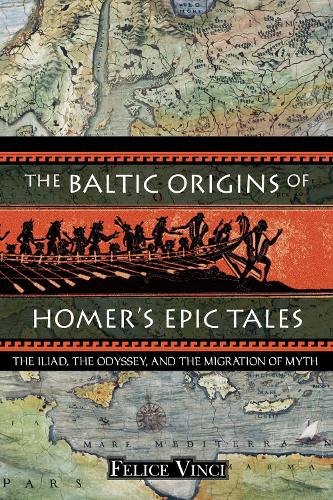
The Baltic Origins of Homer's Epic Tales: The Illiad the Odyssey and the Migration of Myth
(Paperback)
Publishing Details
The Baltic Origins of Homer's Epic Tales: The Illiad the Odyssey and the Migration of Myth
By (Author) Felice Vinci
Inner Traditions Bear and Company
Inner Traditions Bear and Company
20th December 2005
United States
Classifications
General
Non Fiction
883.01
Physical Properties
Paperback
432
Width 152mm, Height 229mm, Spine 24mm
1g
Description
For years scholars have debated the incongruities in Homer's Iliad and Odyssey given that his descriptions are at odds with the geography of the areas he purportedly describes. Inspired by Plutarch's remark that Calypso's Isle was only five days sailing from Britain Felice Vinci convincingly argues that Homer's epic tales originated not in the Mediterranean but in the northern Baltic Sea. Using meticulous geographical analysis Vinci shows that many Homeric places such as Troy and Ithaca can still be identified in the geographic landscape of the Baltic. He explains how the dense foggy weather described by Ulysses befits northern not Mediterranean climes and how battles lasting through the night would easily have been possible in the long days of the Baltic summer. Vinci's meteorological analysis reveals how a decline of the climatic optimum caused the blond seafarers to migrate south to warmer climates where they rebuilt their original world in the Mediterranean. Through many generations the memory of the heroic age and the feats performed by their ancestors in their lost homeland was preserved and handed down to the following ages only later to be codified by Homer in the Iliad and the Odyssey. Felice Vinci offers a key to open many doors that allow us to consider the age-old question of the Indo-European diaspora and the origin of the Greek civilization from a new perspective.
Reviews
"Powerful, methodical, important, and convincing." * Alfred de Grazia, author of Burning of Troy *
It is hard to overstate the impact, both scholarly and imaginative, of Vincis compellingly argued thesis. . . . Scholars will be rethinking Indo-European studies from the ground up and readers of Homers epics will enter fresh realms of delight as they look anew at the world in which Homers heroes first breathed and moved. * Professor William Mullen, department of classics, Bard College *
". . .Vinci engages in intriguing, fascinating, but also well-substantiated speculation on the bases of Homer's works. . . . this work covers many little-known but interesting and colorful aspects of the ancient European world and also enhances appreciation of the literary style and the cultural material and sources of the works." * Henry Berry, Midwest Book Review, May 2006 *
". . . blends history and classical studies with geographical analysis and spiritual insights as it provides evidence linking Homer's tales to northern European, not Mediterranean, origins. From how heroic memories were preserved and locales changed to the origins of civilization itself. . . ." * Diane Donovan, California Bookwatch, June 2006 *
"Vinci's audacious rewriting of Homeric culture and mythology is a creative proposition, which deserves to be further investigated. He has my full vote of confidence." * Georg Feuerstein, Traditional Yoga Studies, Oct 2006 *
"The Baltic Origins of Homer's Epic Tales is a rare example of a book that turns received notions upside-down." * Joscelyn Godwin, translator of Hypnerotomachia Poliphili *
Author Bio
Felice Vinci offers a key to open many doors that allow us to consider the age-old question of the Indo-European diaspora and the origin of the Greek civilization from a new perspective.
